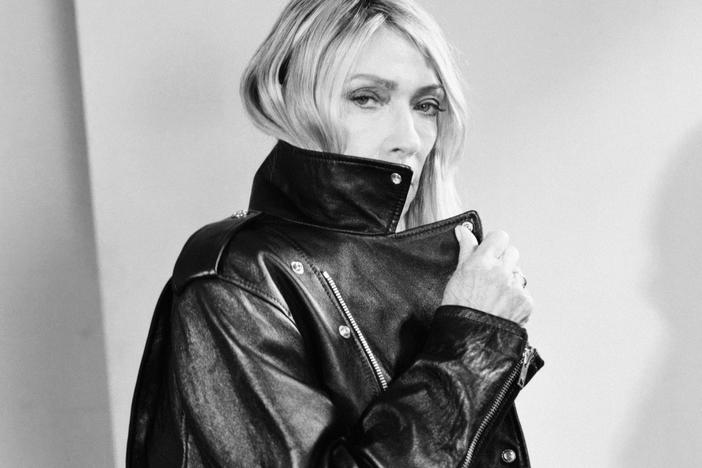Section Branding
Header Content
On 'Running with the Hurricane,' Camp Cope trades rage for quiet confidence
Primary Content
Back in early 2020, Camp Cope was preparing to leave its native Australia to record its third album in Philadelphia. The project was largely solidified — the band had spent Christmas the year before writing songs, oblivious to what would happen in the next three months. But just as all three members were about to depart for the states, the COVID-19 pandemic hit Australia, and their plans were stalled as the close-knit band was pulled apart due to lockdown restrictions.
"We weren't allowed in the same room as each other, we weren't allowed to be in a rehearsal space, there was no possible way to do it," says drummer Sarah "Thomo" Thompson over Zoom from her office in Melbourne, Australia. The project fell on the backburner as the world — and their music career — came to a halt.
For the past two years, the power-emo trio — singer, songwriter and guitarist Georgia "Georgia Maq" McDonald, bassist Kelly-Dawn Hellmrich, and Thompson — put the restless life of being touring artists on the back burner to instead focus on their day jobs. Hellmrich found herself burned out, 10 years deep into her career as an early childhood educator, and decided to move into music merchandising. Thompson focused on her job as a label manager at Poison City Records, which happens to be the imprint the band is on in Australia. And Maq took a different route: She became a nurse vaccinator.
"At the beginning of the pandemic, I lost my mind and made all this weird electronic music and did lots of live streams," Maq recalls while lotioning her face over Zoom. "And then I was like, 'Okay, I should probably do something, and be useful to other people.'"
Just before Camp Cope embarked on what would become a three-year tour in 2016, Maq earned a diploma in nursing, but she never got the chance to use it. That all changed when the pandemic hit. Maq initially began working as a nurse in COVID-19 testing and eventually began to administer vaccinations once they were made available in Australia. "I became a bit of a psycho about the vaccine," says Maq, who is preparing for an afternoon shift as we speak. "I was just so annoyed at anyone who didn't take the vaccine for obvious reasons." She's "very proud" of the fact that she's gotten a lot of people vaccinated, and it's made her more passionate about community health.
Becoming a nurse had some unexpected effects on Maq as an artist: It imbued her with a new sense of confidence. "I felt like what I was doing was important and then that gave me the confidence to be more creative," she says. "Because what I was exercising was a really big part of my life that wasn't creative." That spirit ultimately trickled into the process of making Camp Cope's new album Running with the Hurricane, out March 25, with a title that pays homage to Maq's late father Hugh McDonald and the Australian folk group Redgum, of which he was a member.
For the first time, Maq decided to really learn the art of production. She began making music on Ableton and gained a new "language" that helped her approach this LP differently than previous ones. "Before when we'd made records, it was just like, 'Let's just record us live so that when people see us live, they won't be disappointed.' This was more like, 'Well, we're all gonna die of coronavirus, so let's just try to make something quite beautiful,' " she quips.
With no tour on the horizon, there was no rush to release music; it ended up being to the band's benefit. "We were just making a record to make a record," says Thompson. "It made it a bit different mentally." When lockdown restrictions loosened, Camp Cope emerged as different people with new perspectives. So it only made sense that the music they wanted to release would change, and they refined their sound as they balanced their day jobs with studio sessions. The result is a lo-fi collection of country-tinged folk songs driven by the power of Maq's controlled vocals. "You can feel the little bits of our life going on at our homes, I think, in the new album," says Hellmrich.
When they finally went to record the LP, Maq found more creative control than before, offering additional production working alongside producer Anna Laverty. For the group, a pastiche of influences informed the making of their latest work: Taylor Swift, "bands that like to play in pubs" and drill, to name a few. But Camp Cope also stands by the fact that it had made a record that captured the essence of Alanis Morissette's 1995 alt-rock classic Jagged Little Pill, despite not hearing it until after the project was completed. In Morissette's "You Learn," for instance, the band saw parallels in the song's use of upbeat melodies underpinned by darker lyrical themes.
Released during the peak of the #MeToo movement, the band's 2018 sophomore effort How to Socialise & Make Friends was fueled by the emotional rage that stemmed from the members' own egregious experiences of misogyny in the music industry. But Running with the Hurricane finds a band at peace and embracing tenderness. "I think that we could have gone two ways. We could have gotten even angrier and even harder," says Maq. "But we didn't. We went the opposite way because we refused to let the world harden us." Instead, they returned with a record centered around the quiet confidence of Maq's vocals, which evoke a calming presence while commanding respect.
Though How to Socialise & Make Friends was brimming with blistering guitar riffs and biting lyrics, Running with the Hurricane focuses on depression, crushes and vulnerability, with softer melodies and sparse arrangements. For Maq, penning happy love songs feels inauthentic, and each song on the album explores darkness and lightness in tandem — sometimes in harmony, sometimes not. On "Love Like You Do," Maq longs for human connection despite its pitfalls. "I forgive you, you're not sorry / Pay 'em all back, and you'll still owe 'em something," Maq sings, resigned. "All my songs are like Greek tragedies," says Maq, before refining her comment. "A lot of songs on this album aren't failed romances, but at one point, they were, and I love writing about failed romances because you can get so much out of it."
While their last record kicked off with a fiery kiss-off to sexism with "The Opener," Running with the Hurricane begins with "Caroline," a slow-burning jaunt about longing. Its swelling vocals and minimalist arrangements encompass the band's new approach, but it's also the ideal track to ease listeners into their new soundscape. "I think we're leading people in gently as opposed to just smacking them in the face with some big piano rock opera when they don't know what's going on," notes Thompson. The ferocity of How to Socialise & Make Friends is undeniably still there despite the shift. "Look out boys, I'm on fire / And I'm not going out," Maq declares on "Running with the Hurricane."
One of the most profound realizations comes in a vignette about double texting in the album's lead single "Blue." It's an introspective moment for Maq, who reflects on the exhausting toll mental health can take on love. "It's about leaving something that doesn't serve you and finding something better," she says. It's these moments on Running with the Hurricane that capture how much the band has grown. Instead of returning to the angst that fueled their last LP, they chose optimism and focused on what was within their control. The band that was once so focused on the future, and how the record would sound live on stage, became more mindful.
It may have taken a hiatus and a pandemic, but the members of Camp Cope are comfortably settled into adulthood, confident in their decisions. "The first two records, we were just kids in our early 20s figuring it out," says Maq. "Now we're adults. Instead of fighting things, you just kind of go with it." And they're more empowered to do that than ever before.
Copyright 2022 NPR. To see more, visit https://www.npr.org.
Bottom Content




